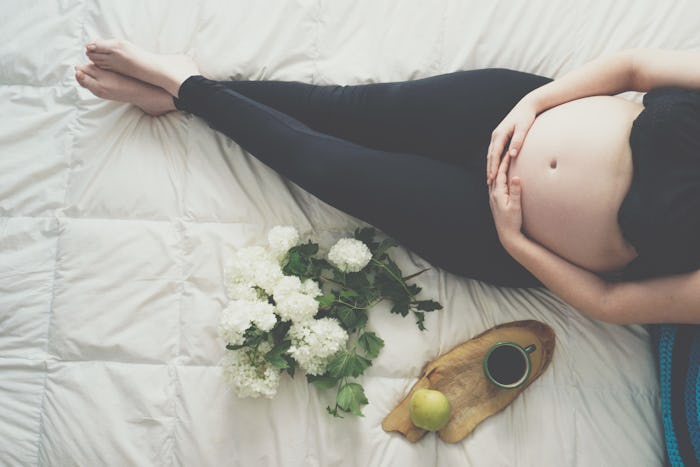Pregnancy is a temporary condition (even though it doesn't always feel that way), but it can have some very permanent consequences — and we're not just talking about your kid, either. After everything your body goes through to make a baby, it shouldn't come as a huge surprise that you'll never be quite the same again, physically (or mentally, or emotionally, if we're being honest!). But how exactly does pregnancy affect your health later in life?
Some of the changes you might experience are actually pretty cool, while others... we're not gonna lie, others are like, not cool at all. But hey, that's all part of being a mom, right? You take the good, you take the bad, you take them both and there you have an '80s sitcom theme song that actually defines motherhood pretty well. It's actually fairly fascinating when you think about how our bodies are programmed to adapt to reproduction, and how unique certain physical traits are to mothers — for the rest of their lives. It's like being part of a secret society! (Or at least that's what you can tell yourself when you're trying to cope with some of those not-so-cool side effects I mentioned.)
Whether you're expecting at the moment or you're a mom trying to figure out what exactly is happening to her body, here are some interesting ways being pregnant can impact your health for life.
1
It Changes Your Brain
You might joke around occasionally about how pregnancy robs you of brain cells, but, um, it actually does — sort of. Research has shown that having a baby can cause long-term changes to the structure of your brain, reported The Guardian, with postpartum women showing a decrease in the volume of grey matter in the areas of the brain connected with "social processes" (does that explain why you can barely carry on a conversation?). This isn't necessarily a bad thing, though, as scientists theorize that this process might be an evolutionary measure that makes it easier for mothers to empathize with their babies.
2
It Reduces Your Risk of Breast Cancer
Talk about a bonus: Because pregnancy reduces your lifelong number of menstrual cycles (and therefore your exposure to ovary-produced hormones), it reduces your risk of developing breast cancer (even more so if you breastfeed), reported the National Cancer Institute. Some researchers also think that the changes breast cells go through during pregnancy and breastfeeding can make them more cancer-resistant.
3
It Reduces Your Risk of Ovarian Cancer
While we're on the topic of cancer, pregnancy also reduces your risk of developing ovarian cancer — and the more kids you have, the better. The Telegraph reported that researchers discovered that women with one child were approximately 20 percent less likely to develop ovarian cancer than women without children (and the risk went down another eight per cent for every additional kid).
4
It Can Cause Incontinence
You might hope that your always-having-to-pee problems will disappear after delivery, but the sad truth is that they might not go away... ever. In fact, stress incontinence (leakage when you laugh, cough, sneeze and the like) can get worse later in life as the vaginal wall — which supports the bladder — weakens. (Having a vaginal childbirth increases your risk.)
5
It Could Make Your Periods Less Awful
If your period was a soul-sucking nightmare from hell before you got pregnant, you might be pleasantly surprised when it returns: Though experts aren't entirely sure why, "some women even find that menstrual pain ceases altogether after pregnancy and childbirth," noted Parents, or at least aren't as severe. Researchers think this might have something to do with having fewer pain receptor sites in the uterus after having a baby (whatever the reason, we'll take it!).
6
It Could Make Your Periods Way More Awful
Yeah, so not everybody gets that awesome "no cramps" perk post-pregnancy. For some women, structural changes to the uterus or conditions like adenomyosis (a thickening of the uterine wall) can make periods longer, heavier and more painful after having kids, said the Cleveland Clinic. So unfair.
7
It Can Make Your Hips Wider
Those "wider" hips don't always fade with the baby weight: The reason why your pre-pregnancy jeans still fit weird is because your pelvic bone structure can actually change during pregnancy, sometimes permanently.
8
It Can Make Your Nipples Darker
Maybe someone warned you that your nipples, areola, labia and even some moles might get a shade or two darker during pregnancy, but did anyone ever tell you they might stay that color forever? Maureen Whelihan, M.D., an ob/gyn at the Center for Sexual Health & Education, told Self that this is definitely possible. (Blame hormones, of course)
9
It Could Change Your Shoe Size
You were probably hoping your swollen feet would go back to normal after delivery, right? The swelling will go likely go away, but your increased shoe size might not. Research has shown that following childbirth, some women have bigger feet forever (possibly because the arches can flatten during pregnancy).
10
It Might Leave You Scarred
They don't call 'em the "badge of motherhood" for nothing: Stretch marks are not only incredibly hard to avoid during pregnancy, they're also incredibly hard, not impossible, to get rid of — although you can help to reduce their appearance with special creams and other treatments (and they will fade somewhat over time).
Check out Romper's new video series, Romper's Doula Diaries:
Watch full episodes of Romper's Doula Diaries on Facebook Watch.
